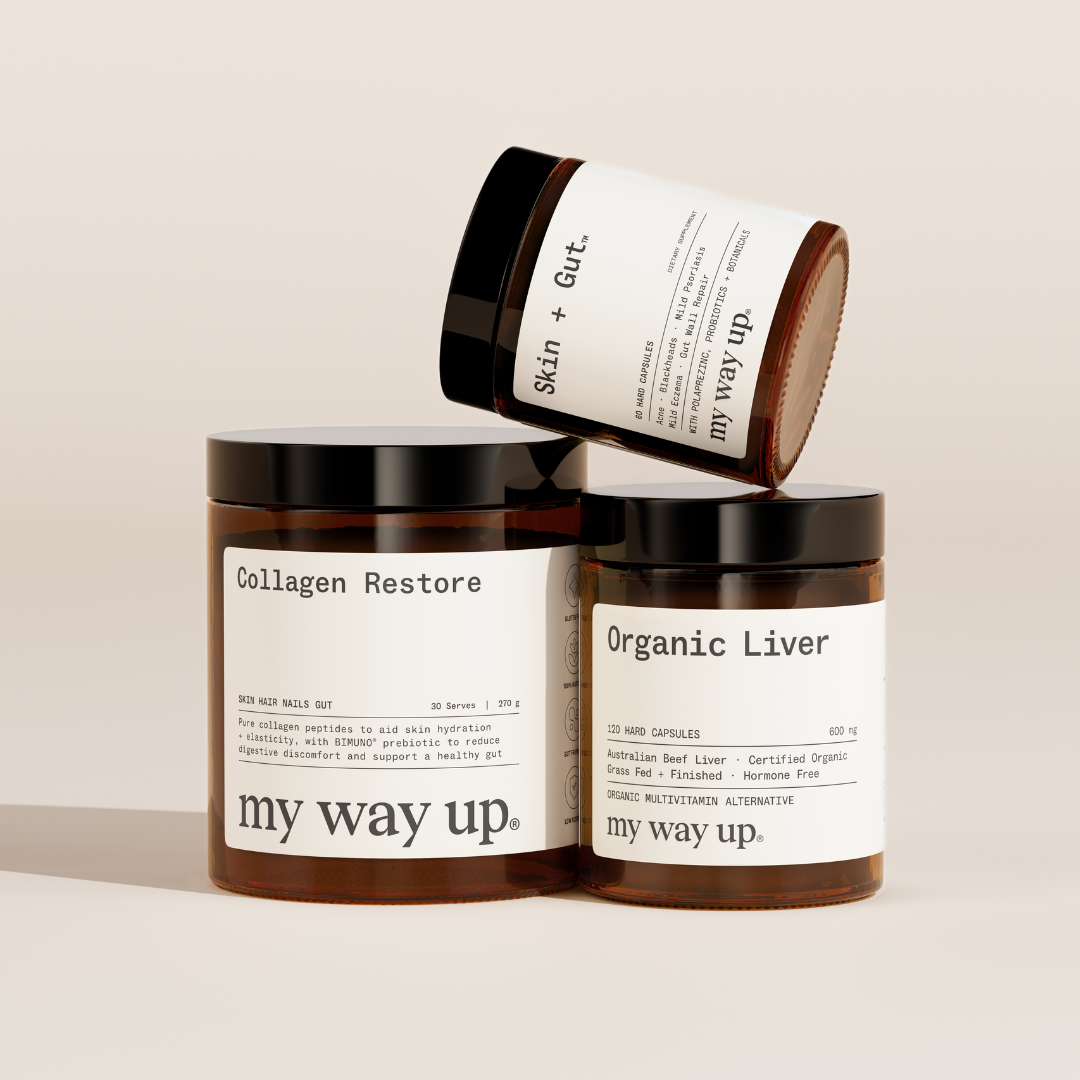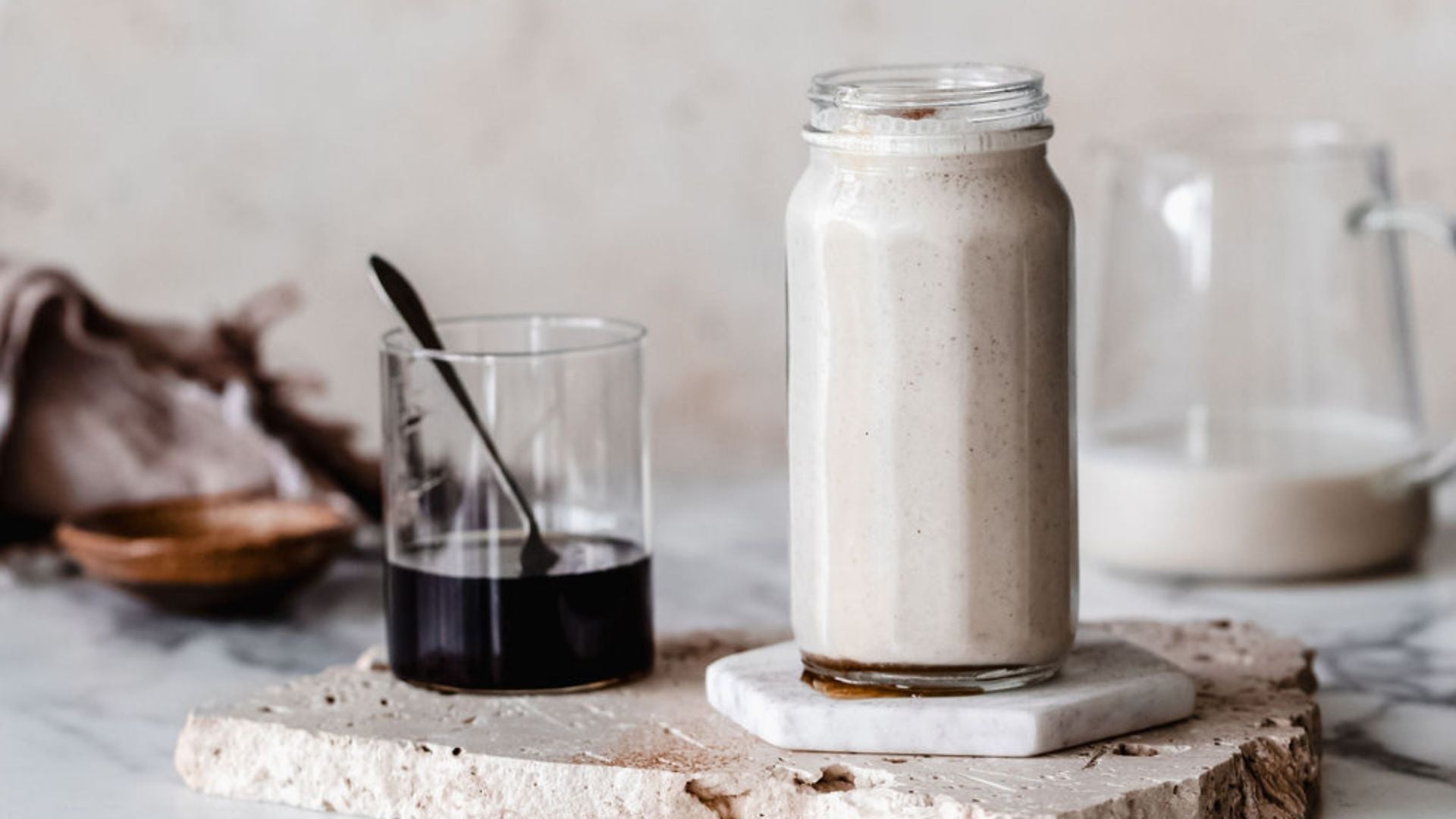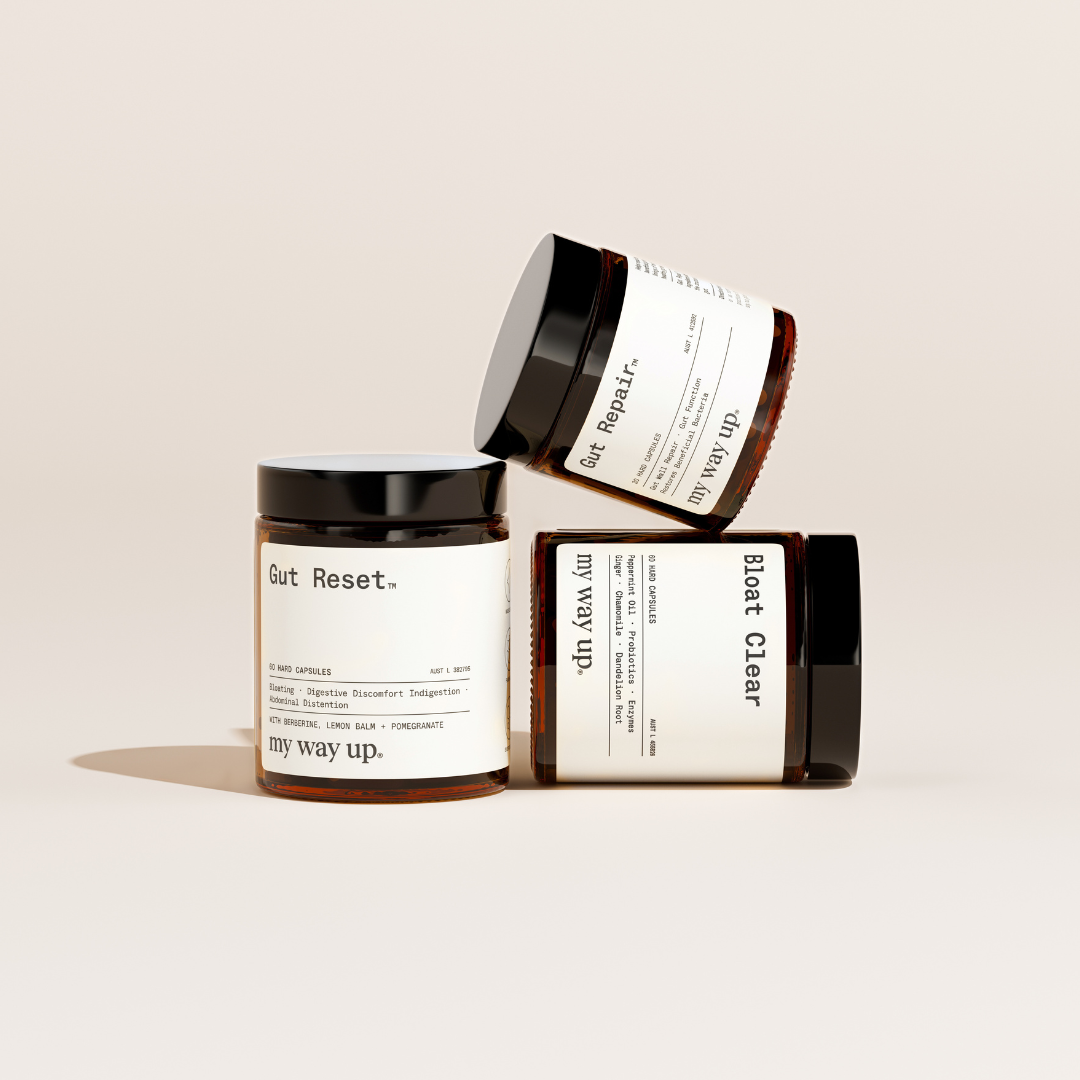Here are some of the top micronutrients found in whole foods and supplements that may help improve AD symptoms, mainly through their anti-inflammatory and antioxidant properties, which support both skin and gut health [2,12]:
Collagen is the skin’s main structural protein, giving it its firmness, elasticity, and ability to retain moisture; as collagen breaks down with age, skin becomes thinner, drier, and more prone to wrinkles and sagging. Boosting the body’s natural collagen reserves can help [13,14].
Don’t forget vitamin C, which is essential for collagen synthesis, skin integrity, and protection against oxidative stress.
Tip: bone broth is the ultimate natural source of collagen, and rich in gelatin, amino acids, and minerals that support skin elasticity. Look for broth made from organic, pasture-raised, or grass-fed animals or make your own. However, hydrolysed collagen in supplements demonstrates greater bioavailability (due to its smaller molecular size, usually between 500 and 2000 Da) and bioactivity (via bioactive peptides that promote collagen synthesis).
Probiotics and prebiotics help balance and preserve the good bacteria in your gut, which in turn supports immune function [15].
Some studies suggest that probiotics may improve symptoms in patients with moderate-to-severe AD[16]. However they may hold more promise for preventing AD than for treating established disease.
Interestingly, breastfeeding appears protective in high-risk children, as it promotes colonisation of beneficial bacterial groups such as Lactobacillus and Bifidobacteria in the gut [17].
Tip: fermented foods (e.g. yoghurt, kefir, kimchi) are a great source of probiotics; and resistant starches in green bananas or cooked and cooled potatoes are a great prebiotic source.
Vitamins D + E
Vitamin D plays a key role in immune regulation—deficient levels are often linked with more severe AD. Supplementation may improve AD symptoms by enhancing skin barrier function and reducing inflammation—especially when combined with vitamin E.
A recent systematic review highlighted that vitamins D and E have the strongest evidence for supporting AD management [2]. While vitamin D does not cure or prevent AD, it may ease symptoms such as eczematous reactions and skin irritation [18].
Tip: along with mindful sunlight exposure, fatty fish, and green leafy vegetables, eating organic beef liver is a great wholefood source of both vitamins D3 and E.
Vitamin A
Vitamin A is essential for skin repair and maintenance—making it crucial for healthy skin.
Tip: while carrots, sweet potatoes, leafy greens are all good sources, organic beef liver is extremely rich in Vitamin A.
Vitamin B6
Vitamin B6 (pyridoxine) contributes to skin health and immune regulation. Deficiency has been associated with more severe AD.
Tip: Organic beef liver is one of the richest natural sources of B-vitamins.
Silica
A powerful mineral that activates enzymes crucial for collagen production. Silica also strengthens the skin barrier, promotes hydration and elasticity, and reduces fine lines and wrinkles [19].
Tip: eat bamboo shoots, a great source of silica bamboo shoots are mildly antibacterial for your gut and can be eaten raw.
Zinc
Zinc supports skin repair, collagen synthesis and has anti-inflammatory properties.
Tip: Oysters have the highest zinc content of any whole food source.
Copper
This essential trace mineral which helps the synthesis and stabilisation of skin proteins.
Tip: shellfish, cocoa, and shiitake mushrooms all provide copper, but our favourite wholefood source is organic beef liver.
Omega-3 fatty acids
Omega-3 fatty acids are crucial for AD management; they calm inflammation by lowering pro-inflammatory cytokines and eicosanoids—small fat messengers that are often too high in AD, and help maintain the skin barrier’s integrity and function.
A recent study found that children supplemented for 4 months with omega-3 fatty acids (DHA and EPA), in combination with vitamin D and GLA (i.e. an omega-6, yet implicated in anti-inflammatory pathways), showed a marked improvement in AD severity—shifting from moderate to mild [20].
The Complete Clear Skin System: a simple, convenient way to support skin healing
Getting all of the above nutrients into your diet may not always be easy.
We formulated the Complete Clear Skin System to help.
The Complete Clear Skin System was formulated with targeted, natural ingredients used in traditional Western Herbal medicine to help clear and repair problem skin from within.
The system works by pairing clinically-studied, targeted botanicals; collagen peptides; vitamin; probiotics; and advanced nutritional compounds like polaprezinc® that work to improve your skin health, by improving your gut health and addressing common problems associated with problem skin.
How the system works
Skin + Gut focuses on restoring skin function and microbiota Skin conditions such as atopic dermatitis (eczema), acne, or psoriasis are linked to impaired skin barrier and microbiota (similar to an imbalanced gut ecosystem).
The formula combines minerals (zinc, copper), vitamins (A, B5, D3), a probiotic strain (S. cerevisiae var. boulardii), and a plant extract (burdock root) to help balance the skin ecosystem through their antibacterial, antioxidant, anti-inflammatory, and detoxifying properties. These ingredients also provide additional support for gut health.
Collagen Restore targets skin structure and gut wall integrity. Bringing the mortar to repair a brick wall is crucial, right? The same goes for your damaged skin. Collagen peptides act as the building blocks for collagen—and collagen is the mortar of your skin’s structure. Silica from bamboo further supports collagen synthesis and skin barrier function.
The formula also works from within, with the prebiotic GOS Bimuno to nourish beneficial gut bacteria, and zinc, which is essential for combating inflammation, reducing oxidative stress, and repairing tissues. Healing your gut will help heal your skin.
Organic Liver Multivitamin supports your daily micronutrient needs. Vitamins and minerals are essential for enzyme and cell function—the very basics! Repairing your skin and gut is a demanding process that requires an army of helpers. Without balancing your micronutrient levels (which are often compromised in skin conditions such as eczema), achieving significant and lasting healing is unlikely.
On top of that, modern diets have become deficient due to soil depletion, which impacts the nutritional quality of food on the market. Organic liver is an excellent way to ensure an adequate supply of vitamins and minerals—without the taste of liver itself.
The Bottom Line
These powerful supplements don’t magically replace a balanced diet and lifestyle—guided by targeted recommendations as listed above—but they can significantly accelerate the process and help restore lasting skin and gut function, so you won’t have to go through yet another fruitless, mismatched protocol that only treats the symptoms.
Always consult a health care practitioner before starting a new supplement protocol. For severe skin conditions, work with a dermatologist.






